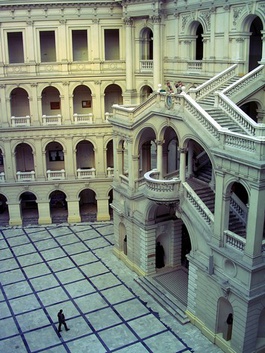
European universities set for battle over Shanghai league table
Published on
Translation by:
 Fiona Herdman Smith
Fiona Herdman Smith
The old European universities are as usual lagging behind while Anglo-Saxon universities are steaming ahead. The Shanghai league table is beginning to get on the nerves of the French Grandes Ecoles, which are trying to create an alternative league table
Continental European universities are lagging behind, and the French Grandes Ecoles are in a sulk. Some French newspapers were quick to employ a decidedly militaristic vocabulary when the Ecole des Mines de Paris, the French engineering school, ‘unsheathed’ (according to L’Express weekly magazine) its ‘anti-Shanghai’ (L’Expansion monthly business magazine) league table to save the ‘tricolour universities’ (Les Echos financial newspaper).
National pride is also at stake
The French university old guard has gone on the counter-attack against the so-called Shanghai world university league table. For some, this is yet another indication that China, like other emerging countries, is leading the way in terms of globalisation. For others, national pride is at stake. Here are some clarifications explaining what the Shanghai league table is exactly.
Which criteria should a university be judged on?
 In essence, the Shanghai league table, created by Jiao Tong University in China, is simply a ranking of the 500 best world educational institutions, on the basis of academic criteria (number of citations in scientific publications, Nobel prizes, etc). And this is where the problem lies. While the great American universities (Harvard, Stanford, Berkeley) are cavorting about at the top of the table, their British and German rivals are still managing to keep up, with about forty of their universities included in the table, France is sinking, with only twenty-three of its universities placing in the table. It is within this context that Valérie Pécresse, the French higher education minister, announced that a European university league table would be set up by the time the French presidency of the European Union came to an end on 31 December 2008.
In essence, the Shanghai league table, created by Jiao Tong University in China, is simply a ranking of the 500 best world educational institutions, on the basis of academic criteria (number of citations in scientific publications, Nobel prizes, etc). And this is where the problem lies. While the great American universities (Harvard, Stanford, Berkeley) are cavorting about at the top of the table, their British and German rivals are still managing to keep up, with about forty of their universities included in the table, France is sinking, with only twenty-three of its universities placing in the table. It is within this context that Valérie Pécresse, the French higher education minister, announced that a European university league table would be set up by the time the French presidency of the European Union came to an end on 31 December 2008.
The Ecole des Mines has gone even further by presenting its own league table of the best world education establishments for the second year in a row. In this league table, it is not the prestige of the professorial cadre which is prized but rather the ‘performance of the training delivered in higher education establishments,’ according to Mines de Paris’ website. Thus the importance of research published in the English language is no longer taken into consideration, but rather the number of former students occupying a position as chairman and managing director in the 500 biggest global companies. This is where the situation is reversed. The French Grandes Ecoles do much better and institutions such as HEC, ENA and Polytechnique are top of the table. Old Europe, and France in particular, can now breathe a sigh of relief.
A league table of league tables?
 However, experts are far from unanimous over the relevance of the selection criteria. Many believe that the Mines’ league table is simply distorted by the large number of French companies among the heavyweights of the world economy. Furthermore, as the researcher Hervé Joly points out, in most cases, the nationality of a company’s registered office and its director is very often the same. So while most French bosses come from the same business schools, it is normal to find those business schools in the top ten in this new league table.
However, experts are far from unanimous over the relevance of the selection criteria. Many believe that the Mines’ league table is simply distorted by the large number of French companies among the heavyweights of the world economy. Furthermore, as the researcher Hervé Joly points out, in most cases, the nationality of a company’s registered office and its director is very often the same. So while most French bosses come from the same business schools, it is normal to find those business schools in the top ten in this new league table.
On the other hand, as German universities do not operate according to the same principle as the Grandes Ecoles but operate rather on the basis of reputation, they are sidelined in the new table. Leading German managers are graduates of a wide range of different universities, according to Hervé Joly. The directors of Mines and Jiao Tong University are discussing the possibility of merging the two league tables and combining the two sets of criteria (academic and effectiveness).
There is no magic recipe for university league tables
In short, there is no magic recipe for university league tables. Before we ask when we will see a league table of league tables, maybe we should first question the relevance of ranking universities of very different nationalities, languages and specialisms.
Translated from Classement de Shanghai : branle-le-bas de combat dans les universités européennes


